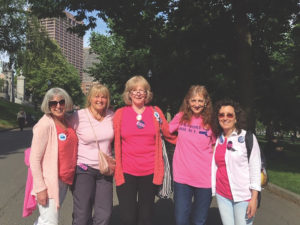
Laurie Veninger of Truro is organizing Cape Cod women to lobby lawmakers on Beacon Hill on Thursday, Nov. 14 in support of a bill aimed at protecting and expanding abortion rights under current state law. The bill, S. 1209, is titled “An act to remove obstacles and expand abortion access.” As of Monday, 24 Cape Codders were signed up for the bus trip. They expect to join hundreds of activists from around the state.
The action has been organized by the Roe Act Coalition, a Massachusetts group founded by NARAL Pro-Choice Mass., the A.C.L.U. of Mass., and the Planned Parenthood Advocacy Fund of Mass.
It’s part of a nationwide movement to pass state laws to strengthen abortion rights. S. 1209 would be the first major overhaul of Mass. abortion law since 1974.
Veninger is a leader of Indivisible Outer Cape and of Cape Cod Women for Change. She said that, with abortion rights protected at the federal level by the Supreme Court’s 1973 ruling in Roe v. Wade, state law has not been called upon to play a role — but that could now change.
“For decades nobody’s been concerned with state law,” she told the Independent, “but now that there’s the possibility of losing Roe v. Wade, we’d revert back to these antiquated laws and language.”
Mass. General Law chapter 112, section 12L provides that abortion is legal before 24 weeks of pregnancy “only if, in the best medical judgment of a physician, the abortion is necessary under all attendant circumstances.” Section 12M of chapter 112 bans abortion after 24 weeks unless it is necessary “to save the life of the mother, or if a continuation of her pregnancy will impose on her a substantial risk of grave impairment of her physical or mental health.”
Proposed changes would replace sections 12L and 12M with a requirement that the state “shall not interfere with a person’s personal decision and ability to prevent, commence, terminate, or continue their own pregnancy,” and would expand abortion access after 24 weeks to include cases “of lethal fetal anomalies, or where the fetus is incompatible with sustained life outside the uterus.”
S. 1209 would also change the use of terms like “mother” and “unborn child” to “person” and “human embryo or fetus.” Proponents of these changes argue that the older usages are inaccurate because a person is not a mother until after giving birth and a fetus is not a child until it is born.
Cape Cod’s only abortion clinic, Woman Care in Hyannis, closed in 2008 after a patient died from wrongful anesthesia administration. Currently women who live on the Outer Cape must travel to either Attleboro or Boston to obtain abortion services.
Outer Cape Health Services CEO Pat Nadle said that her staff can discuss abortion options with patients but do not offer referrals.
“We are a federally qualified health center,” said Nadle in a phone interview. “If you take federal funds you have to abide by a certain set of requirements. One is that you cannot actively refer patients for pregnancy termination.” She added, “In most cases, patients refer themselves.”
A federal program called Title X, established in 1970, protected women’s right to receive nondirective information about abortion. Earlier this year, the Trump administration changed the regulations governing Title X, including striking that protection. That move, however, does not appear to have changed Outer Cape women’s access to information.
That’s because Title X funding, Nadle said, was put in place for patients without insurance or who could not afford reproductive or sexual health services.
“Because we live in Massachusetts, pregnant women are automatically covered by Mass. Health, so we have never needed to tap into that funding source at Outer Cape,” Nadle said.
Per its federal funding mandate, Outer Cape Health Services staff cannot provide abortions and do not prescribe misoprostol, a medication that can induce abortion in the first 10 weeks of pregnancy.
Currently 13 states have passed laws that protect the right to abortion, while 19 have laws that would significantly restrict abortion access should Roe v. Wade be overturned. Many of the near-total bans on abortion (restricting the procedure to before the sixth week of pregnancy or even earlier) passed in 2018 and 2019 have been blocked by courts.
“We are lucky that in Massachusetts women’s reproductive rights are not really a partisan issue,” said state Sen. Julian Cyr, who is a cosponsor of S. 1209. “The Roe Act is about continuing to make sure that we safeguard a woman’s ability to access reproductive health care and a woman’s right to choose in an increasingly hostile federal environment. We want to make it clear that we will continue to protect these rights regardless of what happens at the federal level.”
Passing the Roe Act at the state level would not expand abortion access for women living on the Outer Cape, however, said Cyr.
“For people who live on Cape Cod,” he said, “there’s already limited or no access to these services, and that is unfortunately unlikely to change.”
Because of a reporting error, the print version of this article erroneously identified the Hyannis abortion clinic that closed in 2008 as a Planned Parenthood facility. It was not affiliated with Planned Parenthood.



